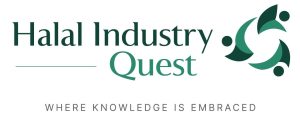
Dr. Mohammad Aizat Jamaludin
Integrating Fiqh and Science in Determination of Halal Status
Ensuring the Halal status of products is essential for Muslim consumers and traditionally relies on Fiqh, or Islamic jurisprudence. However, with the rapid advancements in science and technology, it has become crucial to incorporate scientific methods into Fiqh to address modern challenges in the Halal industry, including food, cosmetics, and pharmaceutical issues.
The Role of Fiqh in Halal Determination
Fiqh, based on the Quran, Hadith, and fatwa (Islamic scholar opinion), provides a thorough framework for distinguishing between Halal (permissible) and Haram (forbidden). It covers various aspects of daily life, including dietary laws. Fundamental principles dictate that food products must be free from Haram substances like pork and alcohol and must not be contaminated with these substances during production.
Science as a Complementary Tool
 Given the complexity of contemporary food production and global supply chains, a more detailed approach is necessary. Here, science plays a vital role. Halal instruments such as Raman spectrometer, Fourier Transform Infrared Spectrometer (FTIR), Differential Scanning Calorimeter (DSC), Gas Chromatography Time-of-Flight Mass Spectrometer (GC-TOF/MS), Supercritical Fluid Extraction (SFE), Ultra-High Performance Liquid Chromatography (UHPLC), Texture Analyzer (TA) and Rotary Evaporator can detect tiny traces of non-Halal substances that are not visible to the naked eye. Genetic testing ensures that animal products do not contain pork derivatives, even in products that appear to be Halal. Additionally, science helps verify the authenticity and integrity of Halal certification. With increasing instances of food fraud, rigorous scientific testing can uncover adulteration and contamination, providing extra assurance to consumers.
Given the complexity of contemporary food production and global supply chains, a more detailed approach is necessary. Here, science plays a vital role. Halal instruments such as Raman spectrometer, Fourier Transform Infrared Spectrometer (FTIR), Differential Scanning Calorimeter (DSC), Gas Chromatography Time-of-Flight Mass Spectrometer (GC-TOF/MS), Supercritical Fluid Extraction (SFE), Ultra-High Performance Liquid Chromatography (UHPLC), Texture Analyzer (TA) and Rotary Evaporator can detect tiny traces of non-Halal substances that are not visible to the naked eye. Genetic testing ensures that animal products do not contain pork derivatives, even in products that appear to be Halal. Additionally, science helps verify the authenticity and integrity of Halal certification. With increasing instances of food fraud, rigorous scientific testing can uncover adulteration and contamination, providing extra assurance to consumers.
Halal Issues in Food, Cosmetics, and Pharmaceuticals
Halal issues in the food industry are often centered on the presence of Haram ingredients such as pork, alcohol, and improperly slaughtered animals. Additives and processing aids, which may not be explicitly labeled, pose significant concerns. For instance, gelatin and meat derived from non-Halal sources are commonly used in various food products. While in the cosmetic industry faces challenges with ingredients like collagen, glycerin, and alcohol, which may be derived from non-Halal sources. Moreover, the use of animal-derived ingredients and the potential contamination during the manufacturing process are critical concerns. Halal certification in cosmetics ensures that all components and manufacturing processes comply with Islamic principles.
In the pharmaceutical industry, the primary concerns include the use of gelatin capsules, alcohol in liquid medicines, and the presence of porcine-derived enzymes in vaccines and other biological products. Ensuring that medications are free from Haram substances is crucial for observant Muslim patients.
Bridging Fiqh and Science
The integration of Fiqh and science requires extensive collaboration. Islamic scholars and scientists must work together to establish guidelines that maintain religious principles while incorporating technological advancements. For instance, determining the Halal status of a new additive involves understanding its source and processing (a task for scientists) and assessing its compliance with Islamic law (a task for scholars). This collaboration can also tackle emerging issues such as the Halal status of lab-grown meat, genetically modified organisms (GMOs), and nanotechnology in food. Each of these innovations presents unique challenges and necessitates a combined approach to ensure they meet both scientific safety standards and Islamic dietary laws.
The Role of Halal Institutes
Institutes such as the International Institute for Halal Research and Training (INHART) are crucial in verifying Halal status. As part of the International Islamic University Malaysia (IIUM), INHART acts as a bridge between Fiqh and science. It conducts extensive research, provides training, and offers consultancy services on Halal matters. INHART’s work includes research in Shariah related to the Halal Industry and developing advanced scientific methods to detect Haram substances and ensure compliance with Halal standards. The institute collaborates with local and international bodies to standardize Halal certification processes, ensuring consistency and reliability worldwide. By merging scientific research with Islamic jurisprudence, INHART and similar institutions enhance the credibility of Halal certification. They offer courses and training programs for industry stakeholders, ensuring those involved in Halal certification are knowledgeable in both Fiqh and the latest scientific methods.
Benefits of Integration
Integrating Fiqh and science in determining Halal status offers numerous advantages. It increases the credibility and transparency of Halal certification, boosting consumer confidence. It also facilitates international trade by providing universally accepted standards, helping Muslim consumers worldwide access Halal products with ease. Furthermore, this integration supports innovation within the Halal industry. By adopting scientific advancements, the industry can create new products that meet Halal standards, catering to the evolving preferences of consumers. This not only expands the market for Halal products but also ensures Muslims can adhere to their dietary laws without sacrificing modern lifestyle choices.
Conclusion
In conclusion, integrating Fiqh and science in determining Halal status is not just beneficial but essential in today’s complex and rapidly evolving food industry. This collaborative approach ensures the Halal industry remains robust, credible, and adaptable, meeting the spiritual and practical needs of Muslim consumers worldwide. The Halal certification process can achieve greater precision, integrity, and trust by fostering cooperation between Islamic scholars, scientists, and institutes like INHART. Through ongoing research, training, and standardization, these institutions play a critical role in ensuring Halal products genuinely comply with Islamic dietary laws, maintaining consumer trust, and expanding the reach of Halal markets globally.


Share this: